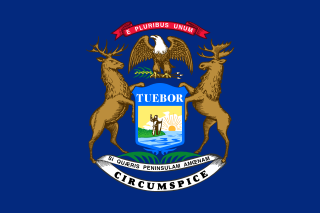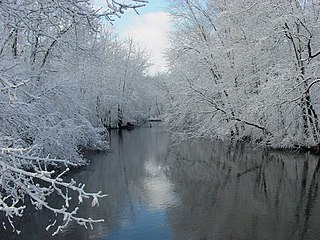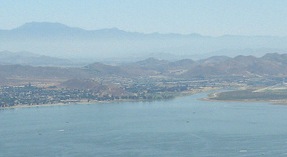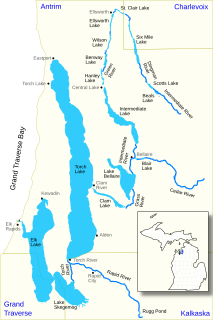| Black River | |
|---|---|
Black River flowing into Lake Michigan | |
| Country | United States |
| Physical characteristics | |
| River mouth | Lake Michigan at South Haven, Michigan 581 ft (177 m) [1] |
Black River is a 4.2-mile-long (6.8 km) [2] river in the southwest part of the U.S. state of Michigan that empties into Lake Michigan in South Haven at 42°24′08″N86°17′04″W / 42.40222°N 86.28444°W , [1] where it discharges past the South Pier Lighthouse. The river takes its name from the dark brown color of its water, which is caused by suspended sediments and organic materials picked up along its course. The river supports a variety of wildlife including trout, snapping turtles, leeches, and many other varieties of flora and fauna. The Black River watershed encompasses 287 square miles (740 km2) across two counties and 13 townships. [3]

In the United States, a state is a constituent political entity, of which there are currently 50. Bound together in a political union, each state holds governmental jurisdiction over a separate and defined geographic territory and shares its sovereignty with the federal government. Due to this shared sovereignty, Americans are citizens both of the federal republic and of the state in which they reside. State citizenship and residency are flexible, and no government approval is required to move between states, except for persons restricted by certain types of court orders. Four states use the term commonwealth rather than state in their full official names.

Michigan is a state in the Great Lakes and Midwestern regions of the United States. The state's name, Michigan, originates from the Ojibwe word mishigamaa, meaning "large water" or "large lake". With a population of about 10 million, Michigan is the tenth most populous of the 50 United States, with the 11th most extensive total area, and is the largest state by total area east of the Mississippi River. Its capital is Lansing, and its largest city is Detroit. Metro Detroit is among the nation's most populous and largest metropolitan economies.

Lake Michigan is one of the five Great Lakes of North America and the only one located entirely within the United States. The other four Great Lakes are shared by the U.S. and Canada. It is the second-largest of the Great Lakes by volume and the third-largest by surface area, after Lake Superior and Lake Huron. To the east, its basin is conjoined with that of Lake Huron through the wide Straits of Mackinac, giving it the same surface elevation as its easterly counterpart; the two are technically a single lake.
Contents
The main course of the river is formed by the confluence of the North Branch Black River and Middle Branch Black River at 42°25′57″N86°14′00″W / 42.43250°N 86.23333°W , northwest of South Haven. The South Branch Black River joins the main course at 42°25′04″N86°15′01″W / 42.41778°N 86.25028°W . [4]
The North Branch Black River is formed out of the Black River Drain, which rises out of a complex of drains including the Leverich Drain and North State Road Drain in Clyde Township and Ganges Township in Allegan County. The Middle Branch Black River is formed by the junction of the Little Bear Lake Drain and Melvin Creek at 42°25′04″N86°15′01″W / 42.41778°N 86.25028°W [5] in southern Lee Township, near the boundary with Van Buren County. The South Branch Black River is formed by the junction of the Lower Jeptha Lake Drain and the Black River Extension Drain at 42°20′10″N86°02′19″W / 42.33611°N 86.03861°W in Columbia Township near Breedsville. [4]

Clyde Township is a civil township of Allegan County in the U.S. state of Michigan. The population was 2,084 at the 2010 census.

Ganges Township is a civil township of Allegan County in the U.S. state of Michigan. The population was 2,530 at the 2010 census.

Allegan County is a county in the U.S. state of Michigan. As of 2010 United States Census, the population was 111,408. The county seat is Allegan. The name was coined by Henry Rowe Schoolcraft to sound like a Native American word.
About three miles above its mouth on Lake Michigan, the river forks, with the South Branch draining Van Buren County. Less than three miles further upstream, the river forks again into the Middle and North Branches. The Middle branch drains areas of both Van Buren and Allegan counties, and the North Branch watershed is entirely in Allegan County.

Van Buren County is a county located in the U.S. state of Michigan. As of the 2010 census, the population was 76,258. The county seat is Paw Paw. The county was founded in 1829 and organized in 1837.













